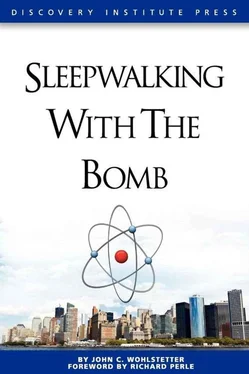John Wohlstetter - Sleepwalking with the Bomb
Здесь есть возможность читать онлайн «John Wohlstetter - Sleepwalking with the Bomb» весь текст электронной книги совершенно бесплатно (целиком полную версию без сокращений). В некоторых случаях можно слушать аудио, скачать через торрент в формате fb2 и присутствует краткое содержание. Город: Seattle, Год выпуска: 2012, ISBN: 2012, Издательство: Discovery Institute Press, Жанр: История, military, Политика, Публицистика, на английском языке. Описание произведения, (предисловие) а так же отзывы посетителей доступны на портале библиотеки ЛибКат.
- Название:Sleepwalking with the Bomb
- Автор:
- Издательство:Discovery Institute Press
- Жанр:
- Год:2012
- Город:Seattle
- ISBN:978-1-93659-906-6
- Рейтинг книги:3 / 5. Голосов: 1
-
Избранное:Добавить в избранное
- Отзывы:
-
Ваша оценка:
- 60
- 1
- 2
- 3
- 4
- 5
Sleepwalking with the Bomb: краткое содержание, описание и аннотация
Предлагаем к чтению аннотацию, описание, краткое содержание или предисловие (зависит от того, что написал сам автор книги «Sleepwalking with the Bomb»). Если вы не нашли необходимую информацию о книге — напишите в комментариях, мы постараемся отыскать её.
RICHARD PERLE, Resident Fellow, American Enterprise Institute and Assistant Secretary of Defense, 1981–1987 Sleepwalking with the Bomb
Sleepwalking with the Bomb — читать онлайн бесплатно полную книгу (весь текст) целиком
Ниже представлен текст книги, разбитый по страницам. Система сохранения места последней прочитанной страницы, позволяет с удобством читать онлайн бесплатно книгу «Sleepwalking with the Bomb», без необходимости каждый раз заново искать на чём Вы остановились. Поставьте закладку, и сможете в любой момент перейти на страницу, на которой закончили чтение.
Интервал:
Закладка:
Less Stable Leaders.Perhaps the most important personality of the 1962 crisis, one whose impulse control was, to put it charitably, weak, was Fidel Castro. He was flush with his improbable revolutionary triumph and seething with rage at the United States—rage that stemmed partly from ideological Marxist fervor and partly from the efforts of the Kennedy administration to get rid of him. Fidel wanted the Russians to incinerate the United States and was willing to sacrifice his 6 million subjects in a nuclear holocaust.
It is today’s Islamic version of Castro who should worry us the most. Religious messianism and secular militarism can be as lethal as romantic revolutionary fervor. Both partake of the “monstrous self-confidence” that Henry Kissinger saw as characterizing the “true revolutionary.” [19] “To be a true revolutionary one requires a monstrous self-confidence. Who else would presume of his followers the inevitable deprivations of revolutionary struggle, except one monomaniacally dedicated to the victory of his convictions and free of doubt about whether they justified the inevitable suffering? It is the pursuit of this charismatic truth—sometimes transcendental, as often diabolical—that has produced the gross misery as well as the profound upheavals that mark modern history. For ‘truth’ knows no restraint and ‘virtue’ can accept no limits; they are their own justification. Opponents are either ignorant or wicked, and must be either reeducated or eliminated.”
The region’s combination of religious zealotry and nuclear capability offers a clear recipe for accidental nuclear war. Fidel’s reckless abandon may well be the augury of nuclear wars to come.
One Iranian Castro candidate is, of course, Iranian President Mahmoud Ahmadinejad. He has infamously said that Israel should be wiped off the map. And consider a 2001 statement by former Iranian president Ali Akbar Hashemi Rafsanjani, still in 2012 a major Iranian power broker, as to nuclear war against Israel:
If a day comes when the world of Islam is duly equipped with the arms Israel has in possession, the strategy of colonialism would face a stalemate because application of an atomic bomb would not leave any thing in Israel but the same thing would just produce damages in the Muslim world.
This comes from an Iranian leader often called by Western analysts a moderate. Rafsanjani has also been quoted as saying in 2001 that if Iran lost 15 million people in a nuclear exchange with Israel but killed 5 million Israelis, Iran would survive but Israel would be extinguished.
As for Israel, though it has been a nuclear power (albeit undeclared) for over 40 years, its status has not ignited a Mideast arms race. When Israel took out the North Korea–supplied nuclear plant in Iran-backed Syria in September 2007, the silence that followed in the Mideast was deafening. American diplomatic cable traffic published online by WikiLeaks showed repeated expression of intense anxiety by America’s Arab allies, who fear a nuclear Iran, not a nuclear Israel.
These problems of a century ago menace the Middle East today. Many statesmen and much of the public seem to think nuclear conflict is unlikely because they assume traditional Cold War deterrence will again prevail. But dangers are growing as time passes, especially as regional instability worsens.
The Resurgence of Militant Islam
LET US be clear about in whose hands a Mideast bomb would be. When the Ayatollah Khomeini took power in Iran in 1979, Western analysts were unaware that Khomenei had published a collection of speeches, under the title Islamic Government, because the volume was then available only in Persian and Arabic editions. According to the great historian Bernard Lewis, the book “made it very clear who he was and what his aims were; and the popular idea that this was going to mean the establishment of a liberal, open, modern society in place of the reactionary Shah was utter nonsense.”
Hailed as Imam (“priest”), Khomeini openly declared an intention to go back 1,400 years to the days of the Prophet—first in Iran and, ultimately all over the world. He imposed a political version of Twelver Shi’ism (the apocalyptic mainstream of the Shia faith; Twelvers await a child imam, who disappeared circa 873 and who will return and bring Judgment Day to the world).
In the 1980s and 1990s Iran was the world’s leading sponsor of global terrorism. Indeed, Iran’s Islamist regime had a role in the planning and logistical support behind the September 11, 2001 attacks, according to findings of fact made by a federal district judge in New York in a lawsuit filed against al-Qaeda. Iran also midwifed Hezbollah (Party of God), which took root in Lebanon, aided by the secular fascist Syrian regime. Hezbollah carried out the October 1983 truck-bomb attack that killed 241 Marine peacekeepers, the worst single-day loss for the Marines since the closing battles of World War II. It also launched a six-week war against Israel in 2006, firing thousands of rockets into northern Israel and virtually paralyzing one-third of the Jewish state’s population.
Followers of Khomeini’s creed include the current leader of Iran, Supreme Guide Ali Khamenei, and Iran’s President, Mahmoud Ahmadinejad—who speaks of an apocalyptic Judgment Day. Of course Iran is just part of a broader global resurgence in Islamism. Among Islamist countries, Pakistan has achieved nuclear weapons status. Now Iran stands at the front of the Islamist queue, with potentially fateful consequences for global stability.
Compounding the problem of Iran’s radical Shi’ism is a parallel resurgence of militant Sunni Islam. Eighty-five percent of the world’s 1.4 billion Muslims are Sunnis—including most of the Muslims the West considers allies. Yet the Sunni turning point in 1979 was little noticed in the West. Fundamentalists that year seized Saudi Arabia’s Great Mosque of Mecca and demanded that the Saudi regime return to a more fundamentalist creed. The Saudi rulers had to summon French commandos in order to retake the symbolic heart of Islam. Paradoxically, the agenda of those vanquished became the agenda of Saudi Arabia in the Muslim world. The back story to this episode was to prove of fateful significance after 1979.
By 1979 Saudi Arabia’s rulers—members of the al-Saud family—were living lavish lives and cavorting with other jet setters. Resentments among fundamentalists grew, and led in time to the seizure of the Great Mosque. The fundamentalists—members of the Wahhabi movement who were mostly Bedouin students and ex-National Guard, following a charismatic Wahhabi zealot—could be dislodged only if the most senior Wahhabi clerics gave consent to the al-Saud to storm the immense Great Mosque, something the Prophet had specifically prohibited. The clerics gave their consent, but for a fateful price: the al-Saud would fund with petrodollars the global spread of militant Sunni Islam. Then they would be permitted to live with one foot, so to speak, in the modern world and the other in the world of Islamic piety. Thereafter Saudi money spread the militant Wahhabist creed to mosques and madrassas (religious schools) around the world.
The radical Sunni creed in Saudi Arabia and the militant Shia theocracy in Iran are ingredients for a Mideast arms race. If Iran crosses the nuclear weapons threshold, the Gulf states will not start a 25-year development program. Saudi Arabia, Kuwait, and Qatar will simply call Pakistan and ask how many atomic bombs the Pakistanis will part with for how many petrodollars. Saudi Arabia reportedly has already done this. Cash-strapped Pakistan can easily afford to sell part of its arsenal or make A-bombs to order.
With their Pakistani bombs and their American bombers, the parties would be armed fully, without the extended learning curve that taught the United States and the former Soviet Union how to safeguard their weapons from unauthorized use or surprise attack. The oft-decried immense size of these countries’ arsenals also helped wean them from a dangerous “use it or lose it” attitude. Countries who might lose their whole arsenal in a single attack are much more likely to use that arsenal upon warning of an attack—a “launch on warning” posture. (If the “warning” was really a flock of geese on the radar screen, the bomb thus launched would be an unintended first strike.) Countries that strike back before the full extent of an attack is known (in strategic parlance, a “launch under attack” posture), could vastly overreact and thus precipitate a full-blown conflict after an initial accidental launch.
Читать дальшеИнтервал:
Закладка:
Похожие книги на «Sleepwalking with the Bomb»
Представляем Вашему вниманию похожие книги на «Sleepwalking with the Bomb» списком для выбора. Мы отобрали схожую по названию и смыслу литературу в надежде предоставить читателям больше вариантов отыскать новые, интересные, ещё непрочитанные произведения.
Обсуждение, отзывы о книге «Sleepwalking with the Bomb» и просто собственные мнения читателей. Оставьте ваши комментарии, напишите, что Вы думаете о произведении, его смысле или главных героях. Укажите что конкретно понравилось, а что нет, и почему Вы так считаете.












